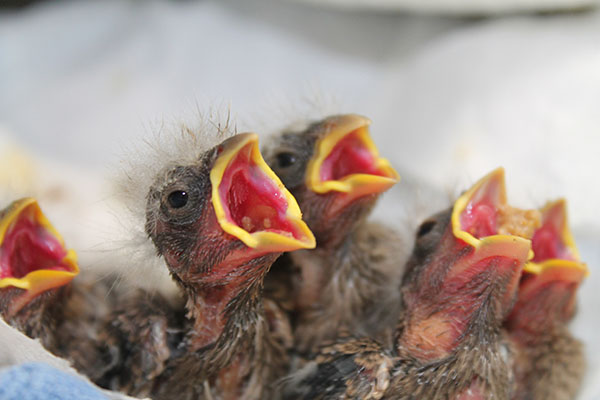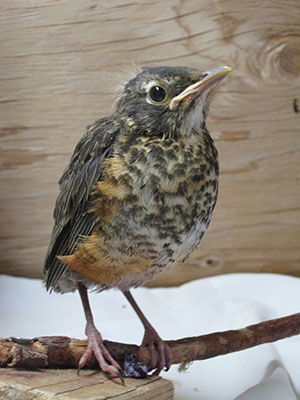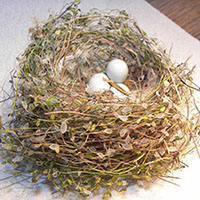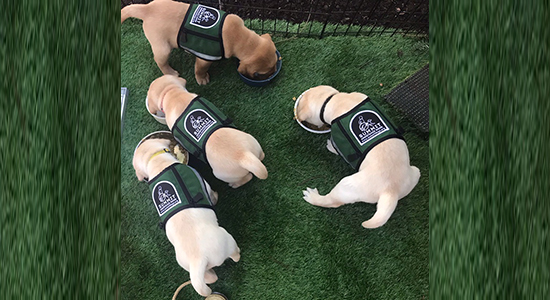— from Shona Aitken for Wolf Hollow —

Sometimes it’s obvious that songbirds are nesting nearby. You see the adults flying back and forth with mouthfuls of food and hear the youngsters chirping to be fed. But often nests are carefully hidden and the parents quietly sneak in and out. Nests can be high in trees, in low bushes, or even on the ground. They can be hidden away in holes, behind flakes of bark on tree trunks, or delicately suspended from small branches. Our buildings can also make suitable nest sites. Swallows like to build nests under the eaves of houses, sparrows and starlings can take up residence in vent holes, and juncos are notorious for nesting in plants pots.
Nests are all around us and the eggs and young birds are very vulnerable, so this is a good time of year to keep your pets under control and think carefully before you get too enthusiastic about tidying up your yard. If you need to cut down trees or trim back bushes, maybe you could do that in September, after nesting season is over, rather than in May and June when there are lots of tiny nests and helpless baby birds around.

This is also the time of year when you may come across a young songbird sitting on the ground. What should you do? That depends on the age and condition of the youngster.
If it’s Injured, e.g. has blood on it, was caught by a cat, or is weak and not moving much, it needs care. The best thing to do is gently place the young bird in a small box padded with bathroom tissue and keep it in a warm, quiet place while you call Wolf Hollow.
If it’s a Nestling – (naked, downy or has only a few feathers, and is lying or sitting down), it should still be in its nest. If you know where the nest is, you can gently pick up the little bird and put it back in the nest. Songbird parents don’t have a keen sense of smell so they won’t be put off by your scent. If you don’t know where the nest is, or it is too high to reach, put the little bird in a tissue-lined box and give us a call.
If it’s a Fledgling – (has most of its feathers and is perching or hopping), it is normal for it to be out of the nest, moving through the branches and starting to flap its wings. At this stage young birds often end up on the ground for a while until they can flap and hop back up into the branches. Watch from a distance to be sure the parents are still feeding the youngster. If there are cats around, you can lift the fledgling up into a bush or onto a tree branch so that it is out of immediate danger.
If you do find a young songbird on the ground and you’re not sure what the best course of action is, you are welcome to give us a call to discuss the situation. Wolf Hollow 360-378-5000.
**If you are reading theOrcasonian for free, thank your fellow islanders. If you would like to support theOrcasonian CLICK HERE to set your modestly-priced, voluntary subscription. Otherwise, no worries; we’re happy to share with you.**









Great article and information; thank you. Wolf Hollow has been fantastic at taking care of birds that need help, and giving advice when a nestling is found. I always feel so sad when people pressure-wash their buildings and kill swallow babies and eggs when these lovely creatures fly thousands of miles all the way from South America to eat our mosquitos! All they need to do is put up some cardboard or a little ledge if they are offended by swallow droppings. By Sept. they’ve flown south and then the nests can come down, to keep other year-round birds from invading the nests and pushing the swallows out of their repeat homes, since they will return to the same spot every year.
Lately I’ve been noticing habitat for birds such as Wilson’s Snipe disappearing. because people are mowing their fields and keeping them all manicured, instead of leaving the grass tall and waiting for the babies to fledge. This is a plea to leave “back 40” natural and the grass long until the fledglings can fly. Many birds nest low to the ground and they are beneficial and beautiful. Let’s help them all we can.